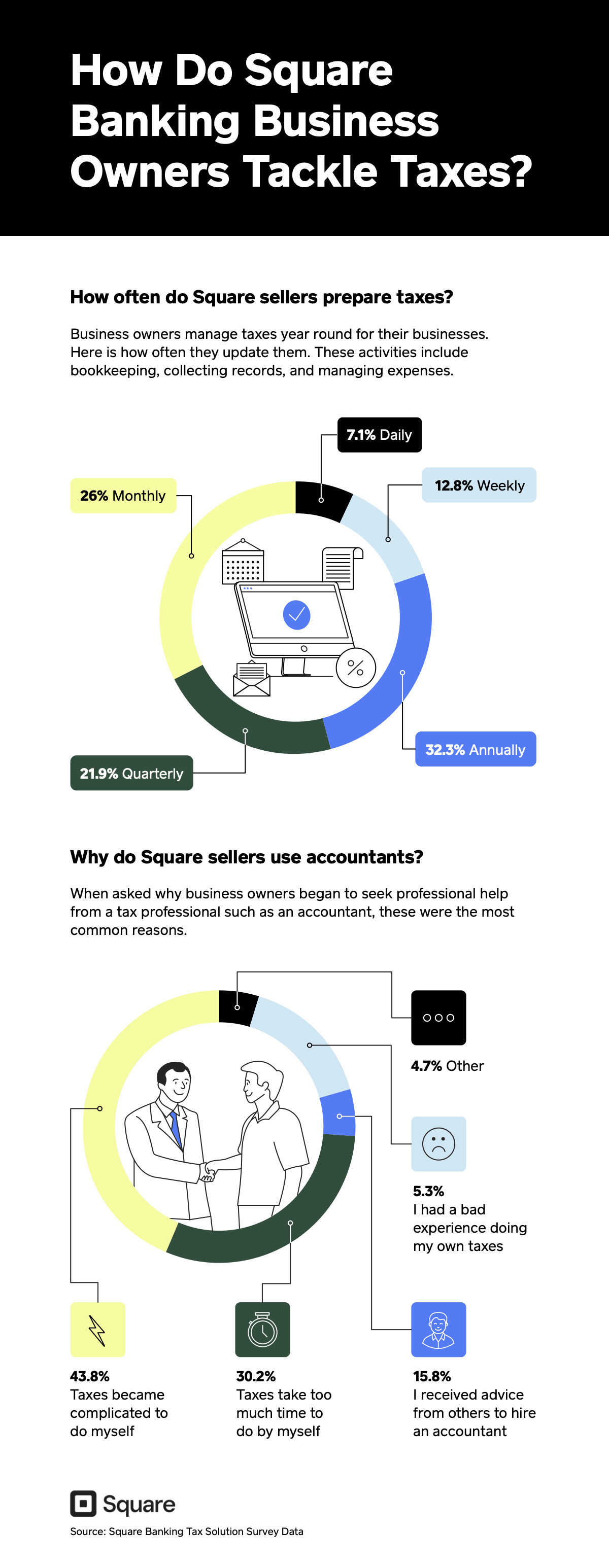Table of contents
Square cannot provide advice on tax issues. This article is for educational purposes and does not constitute legal or tax advice. For specific advice applicable to your business, please contact a professional.
According to the National Federation of Independent Business (NFIB), 50% of small businesses regularly face cash flow problems and for 20% of them the problem is continuous. Surveyed business owners said federal, state, and local tax payments compounded these cash flow problems. The NFIB says tax compliance costs can be up to 67% higher for small businesses versus large ones. Not only is managing taxes complicated for small businesses, large businesses say as they grow, tax complexity has made filing taxes increasingly challenging.
Square conducted surveys and interviews with 1,000 active U.S. sellers around their behaviors, pain points, and needs around business taxes.The following are the ways Square sellers are managing taxes for their businesses.
How Business Owners Are Managing Taxes
Of the struggles that business owners face when filing taxes, many of those surveyed pointed to variables in location, entity type, GPV, and industry creating unique tax circumstances as a top challenge. In addition to this, they cited changing tax rules as another, with yearly updates making it hard to keep track of.
Over half of Square sellers say they tackle taxes on their own or with very little help. Of the business owners surveyed, these were the categories they self-identified as:
The Do-it-Yourself (DIY) Business Owners
Making up about 50% of surveyed sellers were the do-it-yourself business owners. These sellers handle every step of the tax process for their business, including preparing taxes, tracking expenses, filing, and calculating savings as well as liability.
These business owners say some of their experiences with taxes are a bit of “trial by fire,” some citing penalties they received their first year of business as a consequence of mistakes they made while learning. This group of tax filers is setting a foundation for covering all the basics and more through their own systems and ledgers.
Some Tax Jobs Done by Accountants
Coming in at 37%, this next group of sellers hires accountants to do some of the tax jobs needed, but not all of them. Typically they will outsource some tax-related tasks, such as finding the right forms, deciding what to pay, and establishing savings percentages.
Some business owners said that after a couple of years of experience filing taxes, they felt more confident managing tax deadlines and expectations. This group of sellers might test out tax automations and personalizations to make taxes more streamlined. In addition to this they might use software or integrations to track their expenses and consolidate their income sources so everything is all in one place.
All Tax Jobs Done by Accountants
Roughly 13% of surveyed sellers hire out all of their tax jobs to accountants or other employees. In these cases business owners have little to no involvement in the tax filing and management process.
As businesses scale, this can mean more complex tax filings. At this stage, Square sellers whose businesses grew to a large size started investing in ways to save money and proactively solve and plan around possible upcoming tax challenges. This group of sellers cited turning to professionals in order to best invest earnings in a way that might be advantageous while also making business decisions with potential tax implications in mind.
More Money, More Solutions
As businesses scaled in size, an increasing number of surveyed business owners said they used an accountant for all business tax activities while having had some experience filing business taxes themselves. In fact, 87% of respondents reported having past or current experience reporting their business taxes.
The leading reason surveyed business owners sought out professional help for business taxes was that taxes grew too complicated to be managed by themselves.
As their businesses grew in complexity, the amount of taxes they paid typically also increased. Regardless of size, business owners paid federal taxes, state taxes, income taxes, and sales taxes. As those companies scaled, some took on managing capital gains, property, dividends, payroll taxes, and unemployment taxes as well.
Methodology:
The statistics in the article above are based off a survey 1,008 participants were surveyed from the general Square population in the U.S. conducted from December 2021 to January 2021.
![]()












